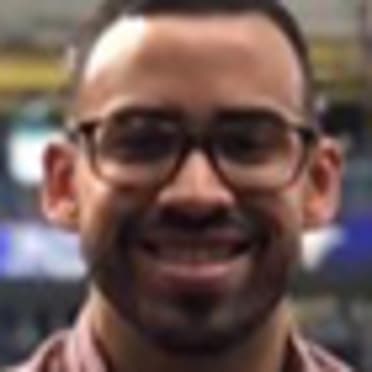ST. PETERSBURG -- The Rays prioritized adding offense this offseason, and they hope to have found it in Japanese outfielder/infielder Yoshitomo Tsutsugo. So much, in fact, that manager Kevin Cash and general manager Erik Neander decided to fly to California to get a firsthand look at the Japanese slugger.
Just days before last week’s Winter Meetings in San Diego, Cash and Neander visited Tsutsugo, who was working out in California with other players like Rockies third baseman Nolan Arenado.
While the Rays have scouted Tsutsugo over the past few years, they wanted to watch him in person. That decision to spend time with him in California, plus Tsutsugo’s connection with Cash, ultimately helped the Rays land the Japanese slugger on a two-year, $12 million deal, despite him receiving larger offers from other teams. The Rays also paid Tsutsugo’s former club, Yokohama, a 20 percent release fee, which will be approximately $2.4 million.
“Throughout the whole process, the Rays were the first team that was interested in me,” Tsutsugo said, through interpreter Daisuke Sugiura. “Kevin and Erik were very passionate, and they were the first team to approach me and they told me, ‘We need you to be able to win this division.’”
Tsutsugo’s ability to hit for power over his career in Japan was what drew the Rays to the slugger.
In 2016, Tsutsugo hit 44 home runs and finished with a 1.110 OPS in 133 games with Yokohama. His production hasn’t slowed since. He has posted an .899 OPS or higher in each of the past four seasons and has connected for 139 home runs over that span.
But perhaps the most underrated -- and important -- part of Tsutsugo’s game is his track record for posting strong on-base percentages. Through his career in Japan, he averaged a .382 OBP, and that’s particularly important to the Rays after trading Tommy Pham, who led the team in OBP last season.
“He has a track record of being really, really successful at a very elite level of baseball,” Cash said. “We’ve had multiple conversations and then we did have the meeting to watch him interact with different people, watch him interact with us, just the way he carried himself. We’re fortunate. We’re getting a guy that can walk in, step in and be himself and be one of our leaders going forward.”
Tsutsugo’s track record and his ability to hit the ball hard give the Rays optimism that the transition to the Major Leagues won’t be as drastic as other Japanese-born players. They do, however, understand the cultural differences and the unique challenges that Tsutsugo will face. Patience will be necessary, but they believe that the reward will ultimately be worth it.
“There’s not a long list of players that can hit the way that he’s hit,” Neander said. “He’s very accomplished. I don’t think it can be stated enough that the level he has produced at over the last four or five years is not common to the players that have made this transition.
“Few have achieved the offensive success that he has, so that combined with our scouting views over time and the physical attributes, how he moves, how his hands move, the standard scouting process, that combination is something that has us optimistic that he’s going to come to this league and find a high level of success.”
Defensively, the Rays hope adding Tsutsugo gives them some more versatility. While the 28-year-old projects mostly as a designated hitter, he can play the corner-outfield spots -- primarily left field. He has also improved defensively at third base despite a small sample size. If he continues to show improvement at third, he would give the Rays a left-handed-hitting option at the position to split time with Yandy Díaz, who is the projected starting third baseman heading into next season. Tsutsugo could also play first base, if needed, but the Rays already have Ji-Man Choi and Nate Lowe as left-handed hitters there.
“The versatility only helps,” Cash said. “We saw what took place last year with injuries and being able to shift guys around and put him in different roles to fill immediate needs when certain guys got hurt; he’s going to add to that mix. I fully expect him to be a presence somewhere right in the middle of our lineup.”
Aside from the challenges that come with the transition, Tsutsugo will have to handle some unique challenges. One question will be if his power will translate to the Major League level. Like all Japanese-born players who make the transition to the United States, Tsutsugo will also deal with adjusting to a different culture.
Tsutsugo, who played 10 games during Winter Ball in the Dominican Republic in 2015, believes he is ready for the challenge and can adapt well to a big league clubhouse.
“Obviously I’ve never faced MLB pitching and I’m really excited about it,” Tsutsugo said. “Throughout my career in Japan, I’ve prepared for this my whole life. I understand the Rays have great data and resources here and with [Cash] and the other coaches, just to be able to help me prepare -- I’m excited for that.”


